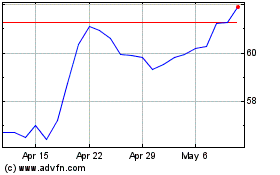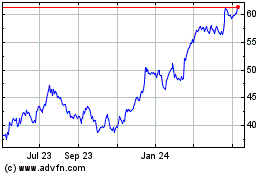- Three-quarters (78%) of Americans report generosity as a core
value
- Half (51%) report not having enough money to give
While generosity is a core value for three-quarters of
Americans, economic concerns have caused some to tighten their
purse strings. Three in ten (29%) Americans report that they have
given less to charity this year compared to the year before and a
full half (51%) feel they don’t have enough money to give to
charity at all.
This press release features multimedia. View
the full release here:
https://www.businesswire.com/news/home/20241112192002/en/
Wells Fargo: American Generosity Squeezed
by Economic Uncertainty (Photo: Wells Fargo)
Even so, 67% of Americans still reported giving something in the
past year, with more than half (54%) saying they give to charity
even though they don’t have a lot of extra money. The study found
that economic concern is a significant factor in declined giving,
with more than half (52%) of Americans reporting that their reduced
giving is a direct result of the current economy.
“The data shows us that the pinch of rising costs is driving a
moral dilemma. Many Americans are in a standoff between what they
want to do and what they can do,” said Stephanie Buckley, head of
Trust Philanthropic Services with Wells Fargo Wealth &
Investment Management.
Despite this dilemma, the study reveals that among the two in
three Americans who made a charitable donation this year, 53% still
report giving the same amount to charity as last year and another
19% report giving more. In fact, 60% of these Americans are so
committed to their giving that they list charity as part of their
budget and one in four (24%) will go as far as to defer their own
financial needs in order to give money.
The study – which is based on a national poll conducted by Ipsos
on behalf of Wells Fargo of 1,004 U.S. adults age 18 and older –
also found that Americans reported giving $1,632 on average to
charity in the past year.
Happiness drives giving
Driving factors of American giving are largely altruistic.
Almost half of Americans are motivated to give to charity because
it makes them happy (46%) and aligns with their personal values
(45%). A third (32%) give because they have a personal connection
to the cause, and a quarter (25%) say they give out of moral
obligation. 20% give out of habit and 17% give because it helps
them feel connected to others.
Comparatively, financial benefits and peer pressure have very
little to do with why Americans give, with only 10% of Americans
giving for tax deduction purposes and even fewer (5%) giving
because their peers are also giving.
“There is a misnomer that many people give for selfish reasons,
particularly among the affluent. When in actuality, I’ve found that
no matter the level of wealth, giving tends to almost always be
driven by wanting to make an impact,” said Buckley. “In fact,
anonymous giving continues to be a rising trend which I believe
lends itself to the idea that most people tend to give
altruistically.”
Givers want to be more strategic
More than half (52%) of Americans do not get any advice about
giving. A quarter (27%) report getting their advice from friends
and family, 21% from internet research, 11% use a charity watchdog
website, and only 6% get advice about giving from a financial
professional like a financial advisor or accountant. Despite the
lack of advice, the majority (57%) of Americans want to be more
strategic in their charitable giving – a sentiment that could be
amplified by the fact that half (49%) of Americans report being
bombarded with request for donations.
“Not having a plan can often lead to a ‘smear the peanut butter’
approach, where people write checks and donate without thinking
about how it aligns to what’s really important to them. Whether you
are giving money, time, or talent, having a plan can help block out
some of the noise and help ensure you are giving with intention,”
said Buckley.
“What’s Giving Tuesday?”
The study also looked at Americans’ awareness of Giving Tuesday
and the impact on giving trends. The majority (64%) of Americans
report not having heard of Giving Tuesday, which was introduced in
2012 on the first Tuesday after Thanksgiving to raise awareness of
the year-end giving season. Among the 36% of respondents who have
heard of Giving Tuesday, 40% report participating and 17% say it
causes them to donate more than planned.
As compared to other trends around that time of year, 31% of
those who have heard of Giving Tuesday report donating as much to
charity on Giving Tuesday as they spend on Cyber Monday or Black
Friday.
“The idea behind Giving Tuesday is to inspire a wave of
generosity. It’s a moment to bring us together, with intention, to
have an impact on the communities around us,” said Buckley.
“Whether you’ve participated before or are just hearing about it, I
would encourage everyone to be thinking about where they can donate
their time, dollars, or talent to the causes that matter most to
them.”
About Wells Fargo
Wells Fargo & Company (NYSE: WFC) is a leading financial
services company that has approximately $1.9 trillion in assets. We
provide a diversified set of banking, investment and mortgage
products and services, as well as consumer and commercial finance,
through our four reportable operating segments: Consumer Banking
and Lending, Commercial Banking, Corporate and Investment Banking,
and Wealth & Investment Management. Wells Fargo ranked No. 34
on Fortune’s 2024 rankings of America’s largest corporations. In
the communities we serve, the company focuses its social impact on
building a sustainable, inclusive future for all by supporting
housing affordability, small business growth, financial health, and
a low-carbon economy. News, insights, and perspectives from Wells
Fargo are also available at Wells Fargo Stories.
Wealth & Investment Management provides financial products
and services through various bank and brokerage affiliates of Wells
Fargo & Company.
Additional information may be found at www.wellsfargo.com
LinkedIn: https://www.linkedin.com/company/wellsfargo
About the Study
These are some of the findings of an Ipsos poll, conducted
September 20-23 2024, on behalf of Wells Fargo. For this survey, a
sample of 1,004 adults age 18+ from the continental U.S., Alaska,
and Hawaii was interviewed online in English.
The sample for this study was randomly drawn from Ipsos’ online
panel, partner online panel sources, and “river” sampling and does
not rely on a population frame in the traditional sense. Ipsos uses
fixed sample targets, unique to each study, in drawing a sample.
After a sample has been obtained from the Ipsos panel, Ipsos
calibrates respondent characteristics to be representative of the
U.S. population using standard procedures such as raking-ratio
adjustments. The source of these population targets is U.S. Census
2023 American Community Survey data. Posthoc weights were made to
the population characteristics on gender, age, race/ethnicity,
region, and education.
News Release Category: WF-ERS
PM-04302026-7251366.1.1
View source
version on businesswire.com: https://www.businesswire.com/news/home/20241112192002/en/
Media Desari Mueller Desari.Mueller@wellsfargo.com
Wells Fargo (NYSE:WFC)
Historical Stock Chart
From Feb 2025 to Mar 2025

Wells Fargo (NYSE:WFC)
Historical Stock Chart
From Mar 2024 to Mar 2025
